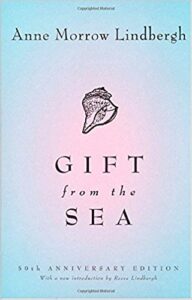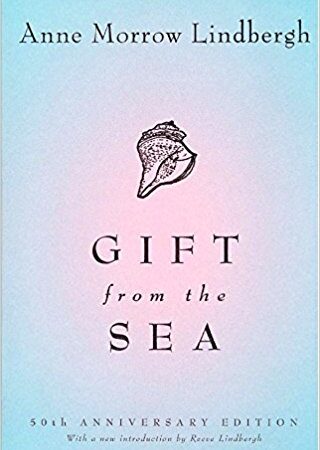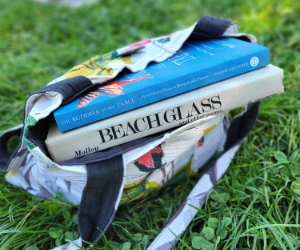 My flight from Los Angeles to Chicago touched down just before rush hour, making the trip home last a solid eight hours (ten including the time change). It marked the end of a busy two days spent sharing one room with three 17-year-olds, navigating LA freeways while listening to hip-hop, taking college tours, visiting friends, and wedged next to a stranger devoted to friendly chit-chat. It was a wonderful trip, but it reminded me that there is one personal item essential to me (even when I don’t have time to unpack it):
My flight from Los Angeles to Chicago touched down just before rush hour, making the trip home last a solid eight hours (ten including the time change). It marked the end of a busy two days spent sharing one room with three 17-year-olds, navigating LA freeways while listening to hip-hop, taking college tours, visiting friends, and wedged next to a stranger devoted to friendly chit-chat. It was a wonderful trip, but it reminded me that there is one personal item essential to me (even when I don’t have time to unpack it):
Solitude.
I’ve gotten good at carving out alone time in my regular routine, so good that I forget how quickly being in the constant company of others can wear me down. I needed a full day of sleep and quiet to return to my natural rhythm and find the clarity to write. And I felt called to return to one of my favorite books, Gift From The Sea, by Anne Morrow Lindbergh, ground-breaking female aviator, writer, wife of Charles Lindbergh, mother of five children.
Lindbergh calls solitude an art. Art is defined as something beautiful, something that expresses important ideas or feelings; certainly, solitude is that. And though she wrote this book more than fifty years ago and speaks mainly to women, cultivating the art of solitude is essential for men as well.
So this week I’d like to share some excerpts from her book that will, hopefully, help you to become, in the tumult of your everyday life, as still as the axis of a revolving wheel.
It is a difficult lesson to learn today—to leave one’s friends and family and deliberately practice the art of solitude for an hour or a day or week. For me, the break is the most difficult. Parting is inevitably painful, even for a short time. It is like an amputation, I feel. A limb is being torn off, without which I shall be unable to function. And yet, once it is done, I find there is a quality to being alone that is incredibly precious. Life rushes back into the void, richer, more vivid, fuller than before. It is as if in parting one did actually lose an arm. And then, like the starfish, one grows it anew; one is whole again, complete, and round—more whole, even, than before when the other people had pieces of one.
Is this then what happens to women? She wants perpetually to spill herself away. All her Instinct as a woman—the eternal nourisher of children, of men, of society—demands that she give. Her time, her energy, her creativeness drain out into these channels if there is any chance, any leak. Traditionally we are taught, and instinctively we long, to give where it is needed—and immediately. Eternally, woman spills herself away in driblets to the thirsty, seldom being allowed the time, the quiet, the peace, to let the pitcher fill up to the brim.
But why not, one may ask? What is wrong with woman’s spilling herself away since it is her function to give?
Here is a strange paradox. Woman instinctively wants to give, yet resents herself giving in small pieces. Basically is this a conflict? Or is it an oversimplification of a many-stranded problem? I believe that what woman resents is not so much giving herself in pieces as giving herself purposelessly.
What we fear is not so much that our energy may be leaking away through small outlets as that it may be going “down the drain.”
We do not see the results of our giving as concretely as man does and his work. In the job of homekeeping there is no raise from the boss, and seldom praise from others to show that we have hit the mark. Except for the child, women’s creation is so often invisible, especially today. We are working at an arrangement in form, of the myriad disparate details of housework, family routine and social life. It is a kind of intricate game of cat’s cradle we manipulate on our fingers with invisible threads.
How can one point to this constant tangle of household chores, errands, and fragments of human relationships as a creation? It is hard even to think of it as purposeful activity, so much of it is automatic. Woman herself begins to feel like a telephone exchange or a laundromat.
If one sets aside time for a business appointment, a trip to the hairdresser, a social engagement or a shopping expedition, that time is accepted as inviolable. But if one says: I cannot come because that is my hour to be alone, one is considered rude, egotistical or strange. What a commentary on our civilization, when being alone is considered suspect; when one has to apologize for it, make excuses, hide the fact that one practices it—like a secret vice!
But women need solitude in order to find again the true essence of themselves; that firm strand which will be the indispensable center of a whole web of human relationships. She must find that inner stillness which Charles Morgan describes as “The stilling of the Soul within the activities of the mind and body so that it might be still as the axis of a revolving wheel is still.”






